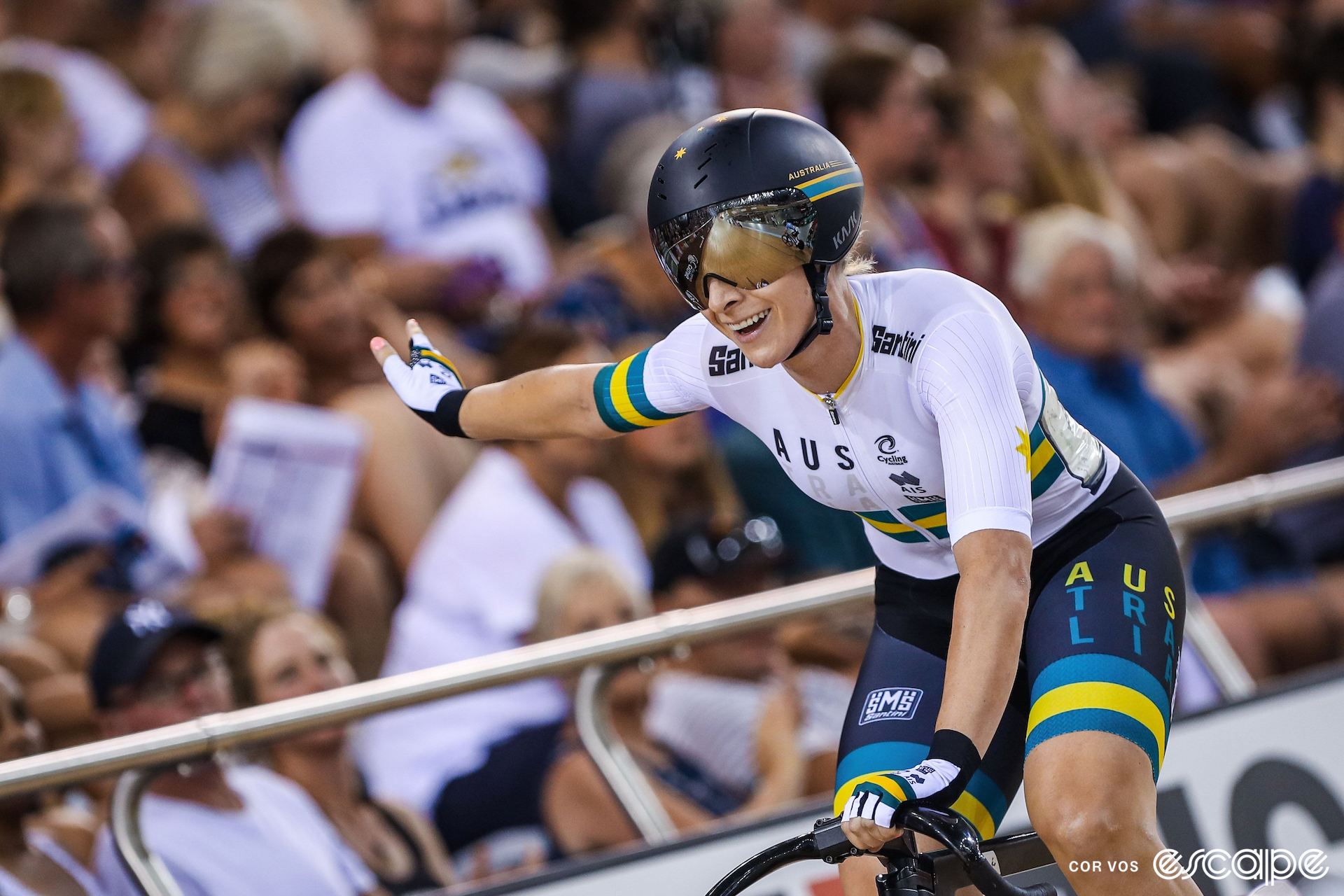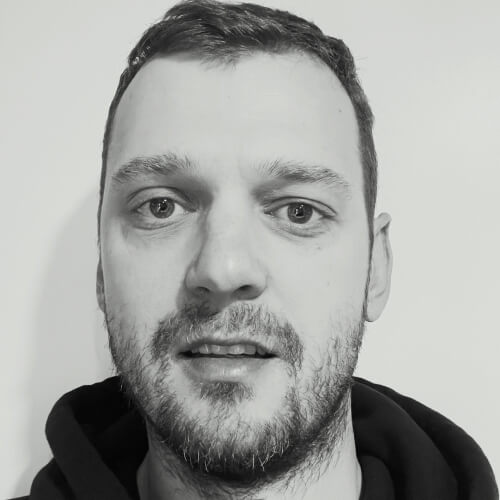When Nettie Edmondson retired from racing on December 6, 2021 she did so with plenty to be proud of. In a decade spent racing at the highest level on the track, the now-31-year-old South Australian became a three-time world champion (2015 team pursuit and omnium; 2019 team pursuit), a two-times Commonwealth Games champion (2014 scratch race; 2018 team pursuit), and a three-time Olympian (taking bronze in the omnium at London 2012).
Edmondson also raced on the road at the highest level for six years, spending two years with Orica-AIS (2013-14; now Jayco AlUla) before joining Wiggle High5 for four years (2015-18). A powerful sprinter, she managed seven professional road victories, including a stage and the overall at the Tour of Chongming Island, plus two stages of the Santos Tour Down Under in her hometown of Adelaide.
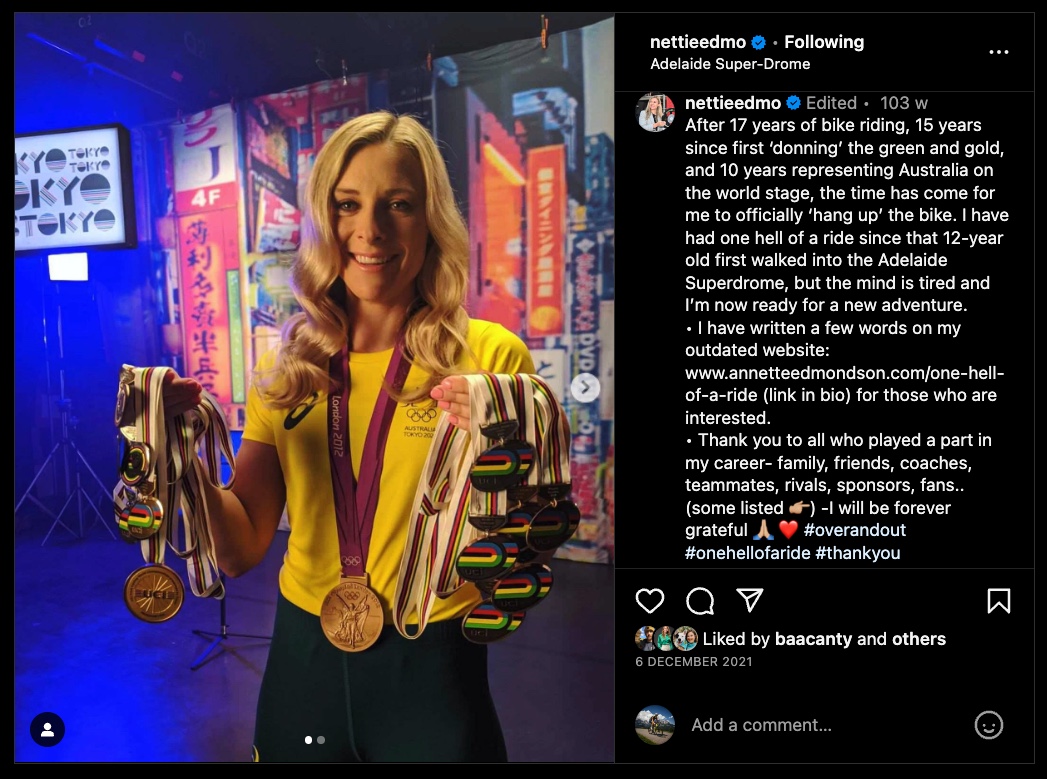
Since hanging up her bike, Edmondson has kept herself plenty busy. No sooner had she finished racing than she was setting up Paradigm Shift Sports (PSS), a rider management agency which exclusively represents female riders. Among the riders represented by Edmondson and co: Lauretta Hanson, Georgie Howe, Megan Jastrab, Alex Manly, the newly retired Jessica Allen, Audrey Cordon Ragot, Georgia Baker, and former Aussie champ Nicole Frain.
As if that wasn’t enough, Edmondson is also an assistant race director at the Tour Down Under, where she’s “targeting the growth of the women’s race after the race’s elevation to World Tour status in 2023”. She’s also an ambassador for various organisations, including World Vision and the Adelaide Football Club, and she’s been doing race commentary this year as well.
Earlier this week Edmondson spoke to Escape Collective from Melbourne where she’d just been in a meeting trying to secure sponsorship for one of her riders. As you’ll read below, Edmondson seems to be in a great space after leaving professional racing behind. And importantly for those following in her tyre tracks, she also seems to be making great strides in helping to improve women’s cycling.
***
Matt de Neef: Can you tell me a bit about how your business came about?
Nettie Edmondson: I started it up because I experienced quite a bit of inequality in women’s cycling and faced a lot of challenges along the way. And I thought, “You know what, I think I could help some of the athletes, either by mentoring or by helping with advice, or trying to represent their needs and their wants on their behalf.”
A few years ago, most riders would have to do contract negotiations on their own, then have to go and face their team management the next day. So it was time for representation.
I can’t believe just how much the sport has changed in the last two years. Most of the top 150 to 200 athletes in women’s cycling now have a manager, whereas it was probably only the top 30 when we first started PSS up. Representation for female cyclists has boomed and I think it’s so good for them and the sport.
Was there a particular experience or experiences that really stood out to you when you were racing, that made you want to move into this space?
I did consider this pathway a couple of years before I retired but I was put off by the contractual side of things. I had a few sponsorship managers throughout my career, but I didn’t need to have a contract manager because my wage was so low. If you received a salary you were lucky. Whereas with sponsorship management, I needed someone to help try and navigate that.
I had a few hints and tips for each of those managers throughout my career so I thought “You know what, maybe I could do this.” I am passionate about bringing sponsors and athletes together – and I do understand the value of sponsors. In a low-paid sport, it can make such a difference to an athlete’s life. I felt that perhaps I could help share that understanding and some of my connections to help give athletes the possibility to pursue cycling as a sport.
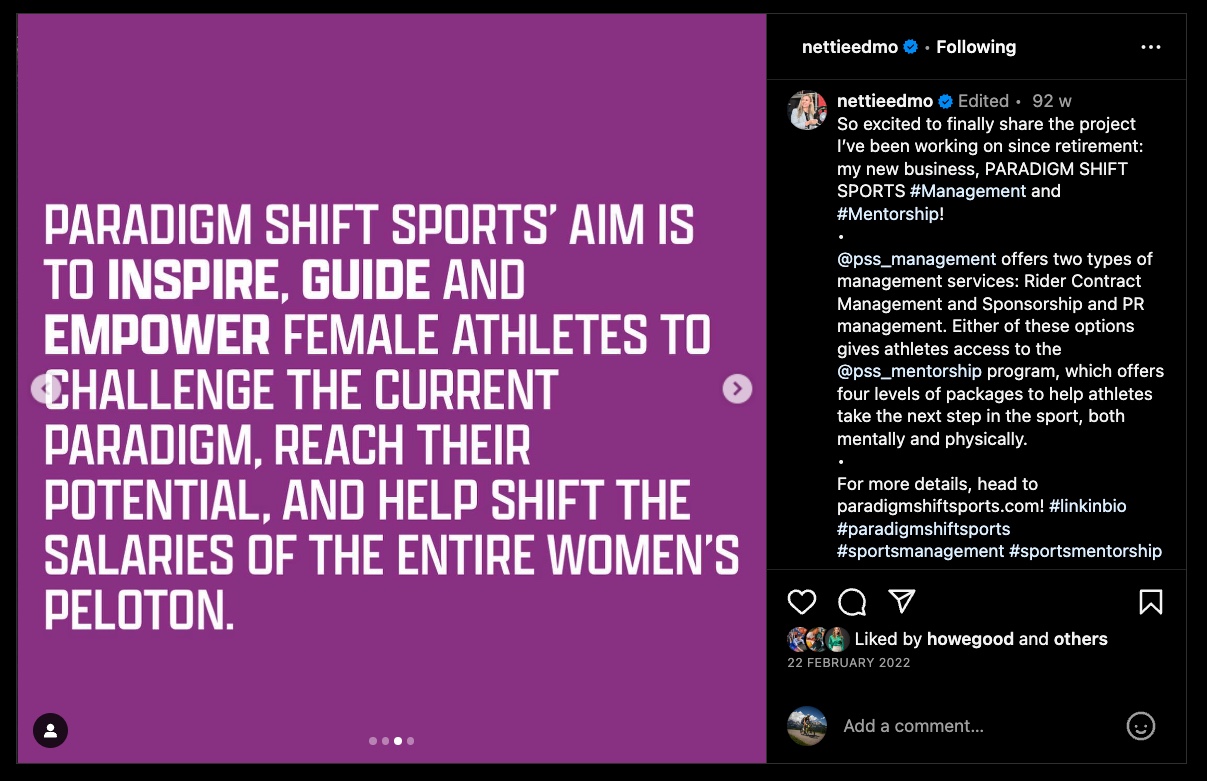
What was it like getting the business off the ground? Was it harder than you thought, or maybe easier than you thought?
To be honest, I was very lucky. It was December [2021], I was talking to a few people in Andorra about setting up my business and two people recommended I get in touch with a girl called Lisa [Jones] – a sports lawyer. She’d been working with Morgan Sports Law as a junior associate for a number of years and she’d worked on some pretty major cases in cycling. She also had a lot of history with UCI rider contracts. She worked with a number of big riders in both men’s and women’s cycling. She had apparently mentioned to a few people that she wanted to do more for female athletes. She couldn’t believe the conditions they were riding under and wanted to do more.
I contacted her in December and said, “Hey, this is what I’m doing. I want to try and do this. What do you think?” She was super supportive and after a 2.5-hour Skype call on December 28, [2021], encouraged me to start it up. I think we got a bit carried away about what we wanted to do.
We wanted to change the world, to be quite literal. We had all these amazing ideas. We talked to a few athletes and they said “Yeah, we’re in, let’s do it.” And so then we started signing riders. We have learnt a lot in a short space of time. Particularly, patience, which certainly isn’t my strong point!
We’re lucky that our riders have also been patient. But now we’re starting to see the results. We focused mainly on contract management in year one, because that was the priority. Now we’re tapping into sponsors, and then the scholarship program, which we want to provide for riders that need support to get to Europe. We’ve also just started up a mentorship programme within our business, which is nice.
We wanted to do all these things at the very start but as mentioned, we’ve had to be patient. We hope to achieve all of our original ideas one day. The last couple of years have certainly been a challenge. A challenge, but a beautiful, wild one.
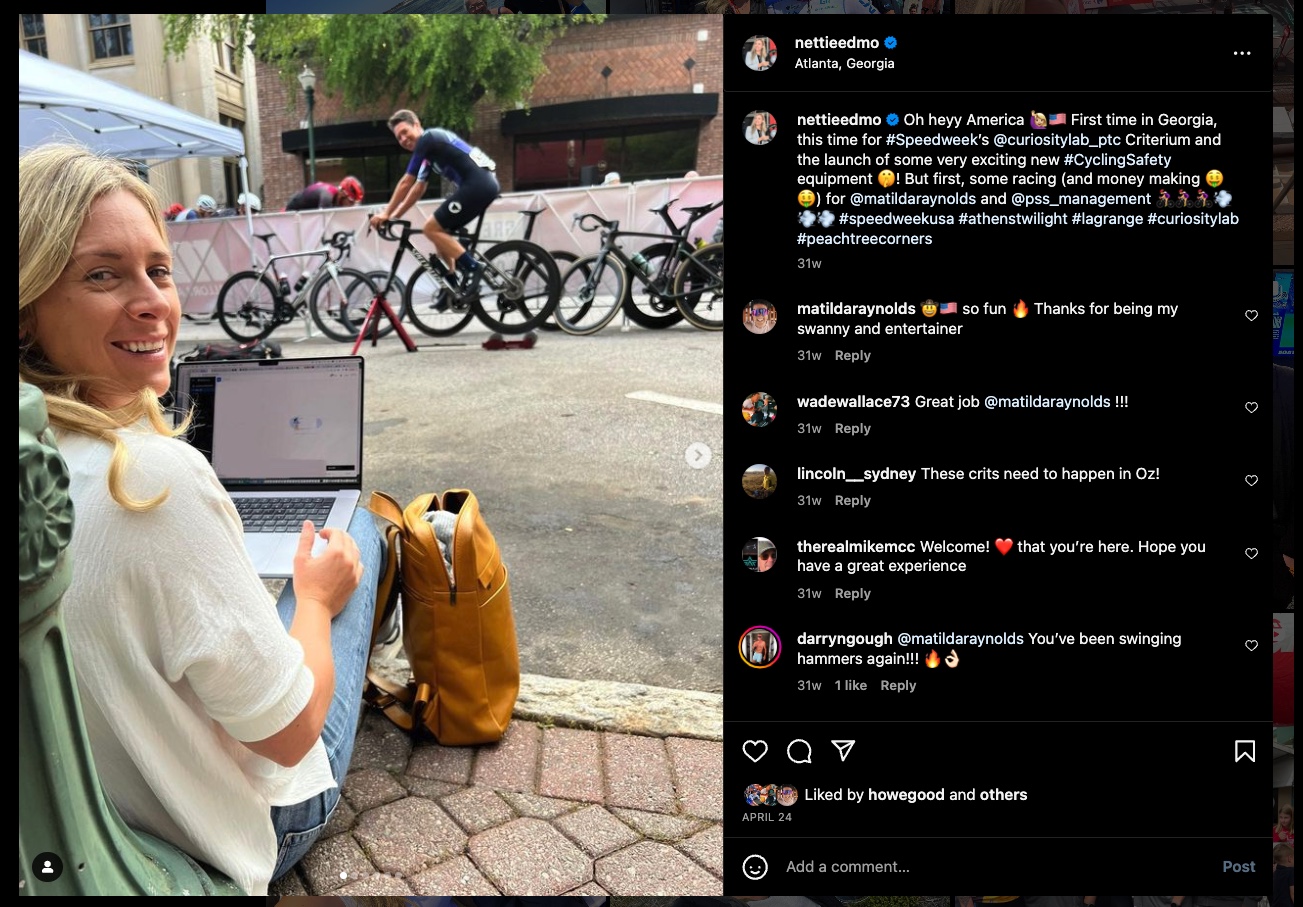
Negotiating contracts sounds stressful. Is that something you enjoy doing? Is it a skill you’ve always had or something you’ve had to work at?
I think it was a skill that I developed naturally. I remember when I was 21 I asked the team that I was in whether I had a contract for the next year, given I won three major races in the calendar as a 21 year old. They said, “Yep, we’ll send it to you soon.” And then a month later, still no contract. A month later, still no contract. And I said, “OK, well, are you gonna send me the contract?” And they said, “Yeah, yeah, here it is.” And it was for $0. And I said, “Well, that’s not really fair. Can we have a meeting?”
I had a meeting a week later and I had three middle-aged white males in a room looking at me, telling me that I was worth $0, and that they were doing me a favour by having me in the team. That was a defining moment for me. There have been a lot of moments since then that I’ve had to fight for my worth throughout my career as a female cyclist. I think through these moments you naturally get that fire and that passion to do something about it.
So that’s what motivates me, when I’m in these meetings on behalf of my athletes. These athletes are worth so much more and they deserve way more than a lot of them are offered. It might also just be that they don’t know their value. So being able to chat with these athletes and explain that side of things is equally important.
There’s obviously some harsh moments in negotiation, which can be uncomfortable, but at the end of the day, if you can pull off something and make a rider’s contract a little bit better, or improve the conditions in some way, then it’s worth it.
It must be really satisfying when the negotiations work out and it all comes together.
Absolutely. We’ve had some pretty big wins, whether it be financially or even just getting clauses in contracts changed. There’s been quite a few major teams as well that have come back to us and said, “This is a standard UCI contract, we’re not making any changes.” And then when I put them in touch with our lawyer Lisa, they quickly back down. It’s very interesting to see. And then you think well, that’s me, [imagine if] the athlete had to do it on their own.
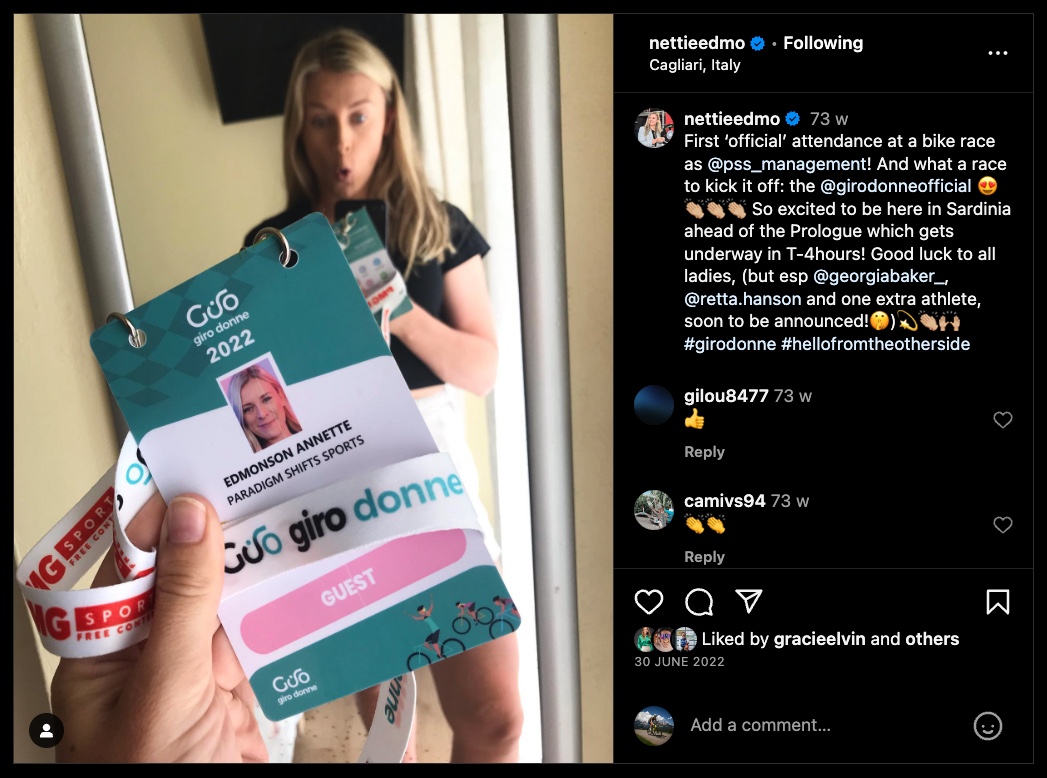
What’s the toughest part of your job?
The challenging discussions when you really have to work hard or fight for things you think should be a given. And also, fighting for places for your developing athletes. The top athletes, they’re generally the ones that are wanted, so the negotiations are usually easier. But we thought it would be a great idea to take on a lot of developing riders, because that’s who we felt we could help the most by finding them opportunities in Europe.
If a team isn’t sold, it’s a lot of work. So that’s challenging. I know just how talented these athletes are and that they just need the chance. So trying to sell that, it’s tricky. But that’s why we’re hoping to create scholarships and other opportunities to get them in front of these teams so they can see it for themselves.
Looking at your website it seems like you have quite a few riders on your books. Is it difficult finding time for everyone? How do you manage all of that?
I think setting expectations. When you take on riders, you ask what they need help with and try to prioritise that. Communication is also important, especially given we were starting up a new business. Letting the athletes know where you’re at, what the projects are, and making sure that everybody’s on board.
You’re about two years into the business now. Do you feel you’ve got a good handle on things now? Do you still feel like you’ve got a lot to learn?
We’re happy. We’re comfortable. I think I’m really lucky that we’ve got Lisa helping us as an external lawyer. I think it’s super important that she’s given so much of her time to make sure that these contracts are tidy, or in most cases, look better for the athlete than when they started.
And then we’ve also got Camila Vargas Sanchez, who is our business strategist. She’s Colombian living in Andorra and she’s also married to a professional male cyclist [Esteban Chaves], so she understands cycling, and she wants to give back as well. So she’s been super at getting us up and running, and focused on the priorities.
And then we also have Lauren Ault, from Victoria, who’s trying to help us with sponsorship for athletes. So I think with our team of four the workload’s not as big as it looks. And yeah, I was very lucky to find them.
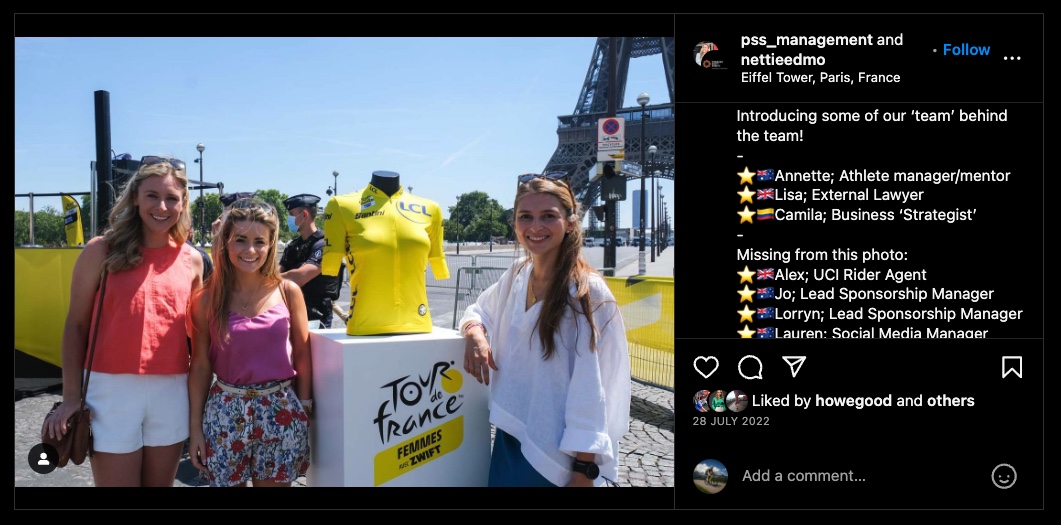
Do you feel like you’re making a difference in women’s cycling like you set out to?
Yeah. Personally, we’re stoked when we get some big wins, but when the athletes are coming back to us, and are super grateful with something we’ve managed to pull off, I think that’s when it’s really, really special.
One athlete said to me after I renegotiated her contract, (with a major salary increase), that she never believed she could be be paid such a salary and that she knows that this is due to people like me, not just now, but as a rider, standing up and paving the way before her. That was probably one of the biggest forms of reassurance from a rider that what we are doing is worthwhile.
But as I said, we’ve had to be really patient and we are still super motivated to continue to try and make a difference for other riders as well, in terms of scholarships and mentoring.
We want to provide more support, and advice for our current athletes through mentoring, but we also want to help them be able to give back to the community. Lots of projects are still to be done but we’re just focusing on one thing at a time.
What’s your own relationship with cycling like these days?
It actually took about six months to want to exercise again. I feel like there’s two types of rider. There’s the riders that are absolutely obsessed, and they don’t want to stop [when they retire]. And then there’s the riders that don’t want to touch their bikes for a while. So it took six months and I probably exercised 20 times in that time.
I slowly started to kind of get back into it and I was doing other sports – I was trying to do a bit more running to create a bit of variation, because obviously I didn’t do much of that. Now I’m doing some charity rides and getting fit for those. And I’m actually really enjoying it now. So yeah, slowly stepping back up, but nowhere near as much as I was back then.
What was it that made you feel like you didn’t want to touch your bike? Was it just that it had been so all-encompassing for such a big part of your life?
Yeah. I didn’t really get a chance to do other things and I didn’t get to go for hikes as often or spend time with other people and fit in with their schedules. I like variation and so it got a little tiring when you’ve done it for that many years.
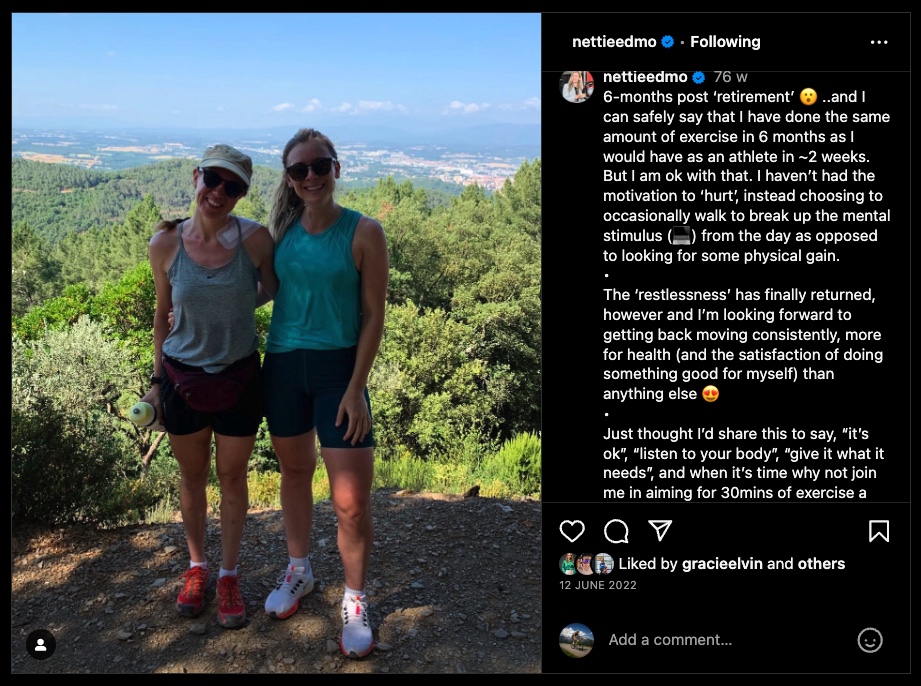
It sounds like you’ve got a better balance in your life now.
Absolutely. December 5 will be two years since I retired from cycling, and that’s absolutely flown. Which means that I’ve just found something I’m so passionate about. I’m just so grateful that I found that in my next phase of life and, yeah, it’s been pretty special.
Before we finish up, was there anything you wanted to add? Anything that people might be interested to know about your business or what you’re up to?
We’re partnering with businesses that see the value in athletes and the transferrable skills that they can offer in the workplace. We’re looking for any other businesses that might want to take on an athlete in a flexible employment capacity, or if they want to partner with them in terms of sponsorship.
We’re about to announce a partnership with our first business soon. That’s been really exciting. One of our riders is a robotics engineer and we’ve managed to find her a nice pathway into a career, along with a brilliant mentor. This athlete said to me that she wouldn’t have had this opportunity without PSS and even though it’s not specifically cycling-related, to know that we’ve made a difference for her life after sport, and given her that confidence that she’s going to be OK, means so much.
This story is part of an ongoing series called ‘Life after Cycling’, in which we speak to former cyclists about what life is like post-racing. Follow the link above to read more articles from the series.
Did we do a good job with this story?
